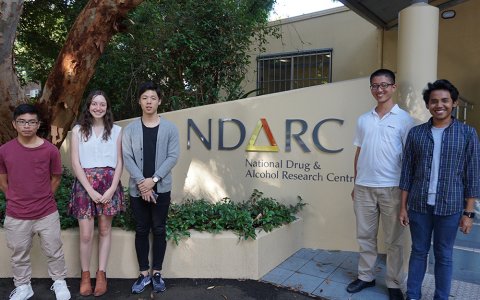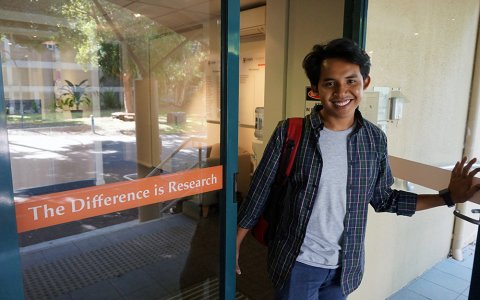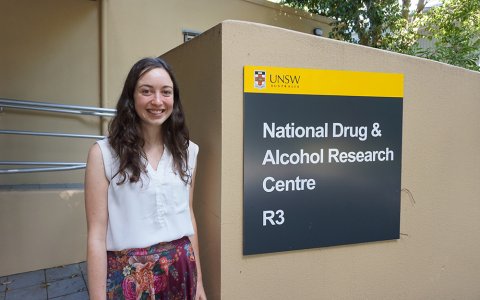Future doctors gain insight into drug and alcohol research at NDARC
A number of research projects in substance use and mental health topics ranging from treatment for opioid dependence to brain training to prevent mental illness and substance use in adolescents; trialling new triage rating guides in an emergency department setting; and co-occurring substance use and mental health disorders are currently taxing the minds of five medical students on secondment at the National Drug and Alcohol Research Centre (NDARC).
The fourth-year students are completing their Independent Learning Project (ILP), a compulsory part of the UNSW Medicine program that aims to provide the students with a period of in-depth study in the broader field of medicine.
Students work in one of UNSW Medicine's Schools or an affiliated research institute or centre for two semesters to complete a research project in an area they find interesting and potentially useful for their future medical career.
NDARC Senior Lecturer Dr Julia Lappin, who is supervising Hafeez Ayub in a project trialling a triage category rating guide for alcohol withdrawal at an emergency department, said the ILP is a great way for medical students to get an exposure to how research is done, and how research can inform their future practice as doctors.
“Understanding how to interpret and do research that is relevant to their patients is essential to ensuring that management and treatment is evidence-based and optimised,” Dr Lappin said.
Hafeez, an international student from Malaysia thinks the ILP is also useful in preparing future doctors to consult and evaluate the latest research evidence.
“It is very helpful because the medical practice has grown a lot from a traditional approach basing decisions on expert opinions and case studies towards more evidence-based practice. I think it is imperative for medical students to be exposed to such research skills as well as critical appraising skills in order to familiarise them for future practice,” he said.
Dr Lappin said the project is a great example of how research can be used in medicine to assess whether changes in practice are benefiting patients.
For ILP student Sasha Cooper, the program is very valuable in helping develop research skills that will be required for future decision making as doctors, and also offering exposure to a real workplace setup.
At NDARC, Sasha is working on a project examining social support and perceived stigma in a two-year follow-up of a cohort of pharmaceutical opioid users in treatment. She said substance use, and especially treatment with maintenance programs is often skimmed over in medical school, so having the chance to dive in deeper is a great enrichment to her studies.
“I did a placement last year at the Langton Centre [for drug dependence treatment] and found it really interesting, especially the crossover between clinical and community care, and how drug use and psychological disorders interact,” Sasha said.
The five ILP students will spend most of the year on their projects, and the benefit from delving into research and broadening their perspectives on research evidence that can inform medical practice will be invaluable to their studies and future work.
We welcome our 2016 ILP student and wish them all the best for their work with us.
















